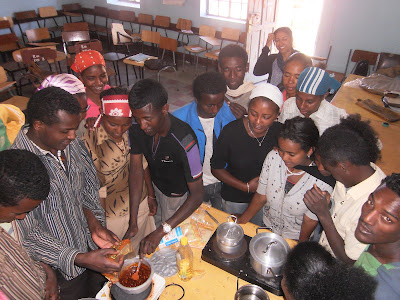To celebrate here are some of the things I love about being in Ethiopia:
Firstly I love the sun - every day the sun shines and it’s always hot during the day time. Just looking up at the sky without a single cloud in the sky makes me happy. It means I can sit in my garden every day in the sun and watch the birds.
I love the people. The people are mostly very nice. I have made so many great friends here. Plus most people have a very relaxed attitude to everything and don’t seem to worry much. I think it’s rubbing off on me, which is probably a good thing.
I love the food. Although I get a very limited variety of fruit and vegetables compared to back in the UK, I know that it’s all fresh and organic. Plus I love the fact that I get fresh milk delivered to me every day just after the farmer has milked his cow in the evening. There are also street vendors and small shops that sell amazing lentil samosas, which are enough to rival any Indian samosa.
I love the fact that when I go out I see cows, goats, horses, donkeys, bulls, sheep, chickens etc. The lambs and kids are so cute that I really want to bring a little one home with me….
I love that the closest corner shop to me, opposite my college, is called The Doctor’s Shop. Why? Well, when the owner was a baby his parents thought he looked like he was going to be a doctor. However, he never became a doctor but the name stuck.
I love the fact that I can still use my hair straighteners in Ethiopia on most days as the electricity is very good.
I love my neighbour’s two children. My neighbour is the Dean of the college - he has a daughter who is three years old and a son who is one and a half. They are the cutest children, and the son calls me ‘Atta’ as he can’t say my whole name. I go to play ball with them in the fields at the weekends.
I love the fact that I never have to think too much about what to wear and I never iron my clothes. No one here cares much about clothes.
I love that I confuse people. When I walk along the road I hear people discussing whether I’m a ‘ferengi’ or a ‘habesha’. Most people can’t tell whether I’m Ethiopian or not when my hair is covered.
I love the views from my house and on my way to the local shops. I see the beautiful gorge and river every day, and miles of fields and crops. So very different to my life back at home.
All that doesn’t mean that there isn’t anything I dislike, but that’s for another day….
 All ELIC activities for this academic year have come to an end - all the classes, clubs, activities and so on. For the students, we held a coffee ceremony in the ELIC and had a programme of students telling stories and reciting poetry. A couple of the students had written particularly good poetry. They also talked about how the ELIC had helped them. It was a great event which the students enjoyed, which is good because we want them to remain excited about the ELIC and use it next year when most of them come back.
All ELIC activities for this academic year have come to an end - all the classes, clubs, activities and so on. For the students, we held a coffee ceremony in the ELIC and had a programme of students telling stories and reciting poetry. A couple of the students had written particularly good poetry. They also talked about how the ELIC had helped them. It was a great event which the students enjoyed, which is good because we want them to remain excited about the ELIC and use it next year when most of them come back.


































